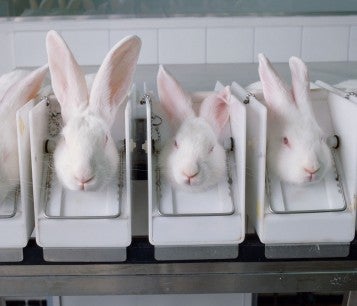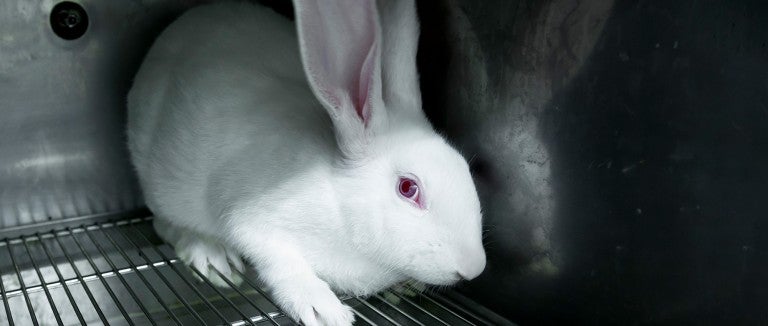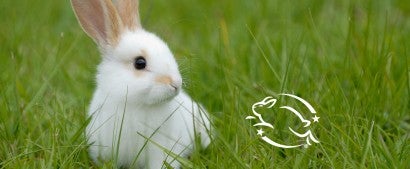Contents
- What products are considered cosmetics?
- Is animal testing legally required for cosmetics sold in the United States?
- Where is cosmetics testing on animals mandatory?
- Where is cosmetics testing on animals banned?
- Why do some cosmetics companies still use animal testing?
- How do I know if my cosmetics are cruelty-free?
- What cosmetics tests are performed on animals?
- Are there other arguments against testing on animals?
- What are the alternatives to animal testing?
- What are you doing to end cosmetics animal testing?
- What can I do to help animals used in cosmetics tests?

What products are considered cosmetics?
The Food and Drug Administration (FDA) defines cosmetics as "articles intended to be applied to the human body for cleansing, beautifying, promoting attractiveness or altering the appearance without affecting the body's structure or functions." Examples include perfume, moisturizer, nail polish, makeup (such as mascara and lipstick) and hair products (such as hairspray and conditioner). Any ingredient used in a cosmetic also falls under this definition. Products often thought of as cosmetics can also be classified as drugs when a medical claim is made. For example, toothpaste is a cosmetic, but toothpaste that advertises cavity protection is also classified as an over-the-counter drug. The same is true for deodorants advertised as antiperspirants, shampoos that make anti-dandruff claims and lotions that contain sunscreen.
Is animal testing legally required for cosmetics sold in the United States?
No. The Federal Food, Drug and Cosmetic Act, regulated by the Food and Drug Administration (FDA), prohibits the sale of mislabeled and "adulterated" cosmetics, but does not require that animal tests be conducted to demonstrate that the cosmetics are safe.
Where is cosmetics testing on animals mandatory?
Historically, the Chinese government required all cosmetics products to be tested on animals. Fortunately, Chinese cosmetics regulations have been modified to eliminate some of these requirements. In 2014, China allowed companies manufacturing so-called “ordinary” cosmetics (such as shampoo and mascara) within the country to avoid animal tests for their products, while still requiring animal testing for imported products. In 2021, China again amended its regulations making it possible for some companies to import ordinary cosmetics into the country without the need for animal testing. We are pleased with the progress, but there is still work to be done, as “special use” cosmetics (such as hair dye and sunscreens) still require animal testing and many non-animal test methods are not yet accepted by Chinese regulators.
Where is cosmetics testing on animals banned?
In 2013, a ban on testing cosmetics on animals and on selling cosmetics tested on animals went into effect in the European Union, paving the way for efforts to find alternatives for common cosmetics tests that use animals. Canada, Chile, India, Israel, Norway, Iceland, Switzerland and Mexico have passed similar laws. Cosmetic companies in the United States and abroad that conduct animal tests are not able to sell their products in these countries unless they change their practices. California, Hawai'i, Illinois, Louisiana, Maine, Maryland, Nevada, New Jersey, New York, Oregon, Virginia and Washington have all passed laws to end the sale of animal-tested cosmetics. Australia, Brazil, Colombia, Ecuador, Guatemala, New Zealand, South Korea, Taiwan and Turkey have also banned cosmetic animal testing.
Why do some cosmetics companies still use animal testing?
When choosing to develop or use new ingredients in their cosmetic products, some companies conduct tests on animals to assess the safety of these new ingredients. This practice is both cruel and unnecessary because companies can already create innovative products using thousands of ingredients that have a history of safe use and do not require any additional testing. Plus, modern testing methods (such as human cell-based tests and sophisticated computer models) have replaced outdated animal tests with new approaches that are often faster, less expensive and more reliable.
What cosmetics tests are performed on animals?
Although they are not required by law, several invasive tests are performed on rabbits, mice, guinea pigs and rats. These can include:
- Skin and eye irritation tests where chemicals are rubbed onto the shaved skin or dripped into the eyes of restrained rabbits, without any pain relief.
- Tests that deliver doses of chemical substances to mice through repeated force-feeding. These tests last weeks or months so researchers can look for signs of general illness or specific health hazards such as cancer or birth defects.
- Widely condemned "lethal dose" tests, in which rats are forced to swallow large amounts of chemicals to determine the dose that causes death.
At the end of the tests, the animals are killed, normally by asphyxiation, neck-breaking or decapitation. Pain relief is not provided. In the United States, a large percentage of the animals used in such testing (such as laboratory-bred rats and mice) are not counted in official statistics and receive no protection under the Animal Welfare Act.
Are there other arguments against testing on animals?
Yes. Animal tests have scientific limitations because animals often respond differently than humans when exposed to the same chemicals, leading to inaccurate estimates of real-world hazards to people.
Results from animal tests can also be quite variable, even between two species (such as mice and rats) and difficult to interpret. Unreliable and ineffective animal tests mean consumer safety cannot be guaranteed. In contrast, non-animal alternatives, such as human cell-based tests and sophisticated computer models, can deliver results that more accurately predict human responses. Non-animal alternatives can also be faster and much more cost-effective than tests that use animals.
What are the alternatives to animal testing?
There are already thousands of products on the market that are made using ingredients with a long history of safe use that do not require any additional tests. Companies can ensure safety by choosing to create products using those ingredients. Companies also have the option of using existing non-animal tests or investing in and developing non-animal tests for new ingredients. Nearly 50 non-animal tests are already available, with many more in development. Compared to animal tests, these modern alternatives can more closely mimic how humans respond to cosmetics; they are also often more efficient and cost-effective. Advanced non-animal tests represent the very latest techniques that science has to offer, replacing outdated animal tests that were developed decades ago.
What are you doing to end cosmetics animal testing?
We—along with our partner, Humane Society International—are committed to ending animal testing forever. Through our Be Cruelty-Free campaign, we are working in the United States and around the globe to create a world where animals no longer have to suffer to produce lipstick and shampoo.
- In the United States, we are working to pass the Humane Cosmetics Act, federal legislation that would prohibit animal testing for cosmetics, as well as the sale of animal-tested cosmetics.
- We are also working in several U.S. states to pass legislation that would help end cosmetics testing on animals. Twelve states (California, Hawai'i, Illinois, Louisiana, Maine, Maryland, Nevada, New Jersey, New York, Oregon, Virginia and Washington) have passed laws banning the sale of animal-tested cosmetics.
- Internationally, 45 countries have prohibited cosmetics animal testing, including every country in the European Union, Australia, Brazil, Canada, Chile, Colombia, Ecuador, Guatemala, Iceland, India, Israel, Mexico, New Zealand, Norway, South Korea, Switzerland, Taiwan, Turkey and the United Kingdom.
- We work with companies throughout the U.S. to gain support for state and federal legislation to end cosmetics testing on animals. The Humane Cosmetics Act now has the support of the Personal Care Products Council, the largest cosmetics trade association, which represents approximately 600 member companies. In addition, more than 400 companies have independently endorsed the bill.
- We have partnered with multinational companies, such as Unilever, L’Oréal, Procter & Gamble and Lush, through the Animal-Free Safety Assessment (AFSA) Collaboration to push for the passage of legislation to end the production and sale of animal-tested cosmetics in the U.S. and internationally. AFSA is also developing and disseminating education and training materials to help companies and government authorities transition to modern non-animal methods.
- We also work with scientists from universities, private companies and government agencies around the globe to promote the development, use and regulatory acceptance of non-animal test methods that will reach beyond cosmetics.
- In addition, we educate consumers about animals used in cruel and unnecessary cosmetics tests, legislation to ban the sale of cosmetics tested on animals and how to shop for cruelty-free cosmetics and personal care products.
What can I do to help animals used in cosmetics tests?
You can help expand the number of companies that meet the Leaping Bunny standard by urging companies to have their products certified as cruelty-free. If a brand you're considering isn't on the Leaping Bunny list, contact the company and ask if its products or ingredients are tested on animals at any stage in the manufacturing process. Also ask if the company sells its products in China, which may require animal testing for some cosmetics. Download a sample letter/email for ideas on how to word your request and check the product or the company's website for contact information.

